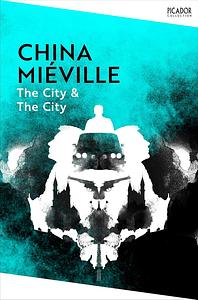You need to sign in or sign up before continuing.
Take a photo of a barcode or cover
challenging
dark
mysterious
medium-paced
Plot or Character Driven:
Plot
Strong character development:
No
Loveable characters:
Complicated
Diverse cast of characters:
No
Flaws of characters a main focus:
No
adventurous
mysterious
tense
medium-paced
Plot or Character Driven:
A mix
Strong character development:
No
Loveable characters:
Yes
Diverse cast of characters:
Yes
Flaws of characters a main focus:
No
adventurous
challenging
dark
mysterious
reflective
tense
medium-paced
Plot or Character Driven:
Plot
Strong character development:
Complicated
Loveable characters:
Complicated
Diverse cast of characters:
Yes
Flaws of characters a main focus:
No
Perdido Street Station so completely captivated me--a crude, messy, but endlessly inventive and wonderfully entertaining adventure fantasy, one that ended in notes of such perverse poignancy that I felt as though I was reading a perfect mirror image of Tolkien--that I wanted more China Miéville immediately, and The City and The City was the volume of his which seemed to have the strongest recommendations from my friends. It did not disappoint. Like with Perdido, Miéville has immense skill in putting the reader into a story in medias res, playing the demands and expectations of us readers by revealing organically some (but not all) the details we need by clever use of the perspective and knowledge of the narrator. In this case, the narrator is Inspector Tydor Borlu, a police detective in the strangely divided city of Beszel and Ul Qoma. Borlu is a smart and experienced cop, but he is also born and bred in Beszel, which means he's been raised from infancy being taught to not see, except in very limited and exception circumstances, the people, buildings, roads, shops, everything, of Ul Qoma...even though that "city" occupies exactly the same space as Beszel, and all of its inhabitants (who have all been similarly trained as Beszelites) go about their lives in right alongside all the inhabitants of Beszel. The fundamental weirdness of the story is thus revealed from our attempting to follow along Borlu, who makes use of all the tools of the detective trade, as he tries to crack a murder case--yes, Miéville has written a straight-up police procedural here, one that takes place in our world and our time--while operating within a civic environment that is psychologically, and perhaps literally, haunted with perfect dopplegangers all living side by side.
It's terrifically written; while the climax of the case--twists and turns, political corruption, etc.--was ultimately a little predictable, I didn't mind at all, because the weirdness (a weirdness reflected in the habits of speech used by every character in the novel, habits and references which, to this American reader anyway, came across as doubly-strange because I know so little about cultural milieu of far southeasten Europe; while it's never specified, Beszel/Ul Qoma is clearly imagined to be somewhere in the Bulgaria/Romania/Ukraine region of the world) carries through until the end. The only thing which prevents me from saying I love the novel is that I kind of feel Miéville cheats a little; throughout the book, in a variety of ways, the possibility of some magical or alien force behind the division is suggested, and sometimes almost explicitly invoked...but never quite, enabling Miéville, in the penultimate set piece of the novel, to plop, with perfect consistency, in a couple of scenes of dialogue which make it very clear that this weird division is wholly psychological (Miéville uses a brusque, unconcerned, very wealthy American visitor to the city to make this point with great effect). The result of this is that the climax, besides being slightly predictable, felt to me slightly undermined by the recognition that the weirdness generating the terms of the final confrontation between Borlu and the villain were entirely in their heads, entirely chosen, not "real." Maybe this is Miéville trying to make a meta-comment on the nature of fantasy in the first place, maybe not. Either way, after 300-pages of this kind of narrative description, the fact that some of its force felt a little drained didn't stop me, as I said above, from enjoying it until the end.
I'm still up for more Miéville, but I think I want to get back to Perdido's world of New Crobuzon. Recommendations, anyone?
It's terrifically written; while the climax of the case--twists and turns, political corruption, etc.--was ultimately a little predictable, I didn't mind at all, because the weirdness (a weirdness reflected in the habits of speech used by every character in the novel, habits and references which, to this American reader anyway, came across as doubly-strange because I know so little about cultural milieu of far southeasten Europe; while it's never specified, Beszel/Ul Qoma is clearly imagined to be somewhere in the Bulgaria/Romania/Ukraine region of the world) carries through until the end. The only thing which prevents me from saying I love the novel is that I kind of feel Miéville cheats a little; throughout the book, in a variety of ways, the possibility of some magical or alien force behind the division is suggested, and sometimes almost explicitly invoked...but never quite, enabling Miéville, in the penultimate set piece of the novel, to plop, with perfect consistency, in a couple of scenes of dialogue which make it very clear that this weird division is wholly psychological (Miéville uses a brusque, unconcerned, very wealthy American visitor to the city to make this point with great effect). The result of this is that the climax, besides being slightly predictable, felt to me slightly undermined by the recognition that the weirdness generating the terms of the final confrontation between Borlu and the villain were entirely in their heads, entirely chosen, not "real." Maybe this is Miéville trying to make a meta-comment on the nature of fantasy in the first place, maybe not. Either way, after 300-pages of this kind of narrative description, the fact that some of its force felt a little drained didn't stop me, as I said above, from enjoying it until the end.
I'm still up for more Miéville, but I think I want to get back to Perdido's world of New Crobuzon. Recommendations, anyone?
The mystery had an ultimately satisfying ending but I didn't really care for the writing style.
The City and The City was my introduction to China Miéville, and what a compelling entry point it turned out to be. A metaphysical murder mystery at its core, the novel seamlessly blends speculative fiction with the structure of a classic police procedural. I was fascinated by the premise: two cities—Besźel and Ul Qoma—occupying the same geographic space, yet entirely separate in the minds of their residents. Citizens are trained to "unsee" people, buildings, and even colors that belong to the other city, creating an eerie psychological split that feels both surreal and strangely believable.
Miéville builds this world with remarkable precision. The concept of the "breach zone"—a liminal space between the cities—and the hidden city of Orciny, which belongs to neither, adds further layers of mystery and tension. The investigation into the murder of a foreign student draws Inspector Tyador Borlú of Besźel and his Ul Qoman counterpart, Dhatt, deeper into the murky politics and fragile fabric that binds and divides the two cities.
While I felt the novel lost some of its momentum in the final third, and the tension tapered slightly before the conclusion, I still found the ending satisfying and thought-provoking. This was a thoroughly original and intellectually engaging read—and a fantastic introduction to Miéville’s work. I’m definitely keen to explore more of his writing.
adventurous
mysterious
tense
fast-paced
Plot or Character Driven:
Plot
Strong character development:
No
Loveable characters:
Complicated
Diverse cast of characters:
No
Flaws of characters a main focus:
No
adventurous
mysterious
medium-paced
Plot or Character Driven:
Plot
Strong character development:
No
Loveable characters:
No
Diverse cast of characters:
No
Flaws of characters a main focus:
No
mysterious
medium-paced
Plot or Character Driven:
Plot
Strong character development:
No
Loveable characters:
N/A
Diverse cast of characters:
No
Flaws of characters a main focus:
No
There is a definite surreal feel to this book. You get that right from the beginning. The book lives in constant edge of fantasy, but is never quite fantasy. Which makes the read quite unique.
I found the prose rather inaccessible at the beginning. When the mechanics of the two cities existing interlaced with each other becomes clear, then it's a much better read. The characters aren't really that fleshed out but that's adequate for this is a procedural crime thriller.
It is a crime thriller but beyond that it's the character study of two cities. Two extremely weird cities/countries. And the various political and administrative elements that exist around it. It's nothing like anything I've read.
The suspense of the crime thriller is decent, nothing much to gawk at. But the cities which are the focus of the story makes it a very interesting read.
I found the prose rather inaccessible at the beginning. When the mechanics of the two cities existing interlaced with each other becomes clear, then it's a much better read. The characters aren't really that fleshed out but that's adequate for this is a procedural crime thriller.
It is a crime thriller but beyond that it's the character study of two cities. Two extremely weird cities/countries. And the various political and administrative elements that exist around it. It's nothing like anything I've read.
The suspense of the crime thriller is decent, nothing much to gawk at. But the cities which are the focus of the story makes it a very interesting read.





